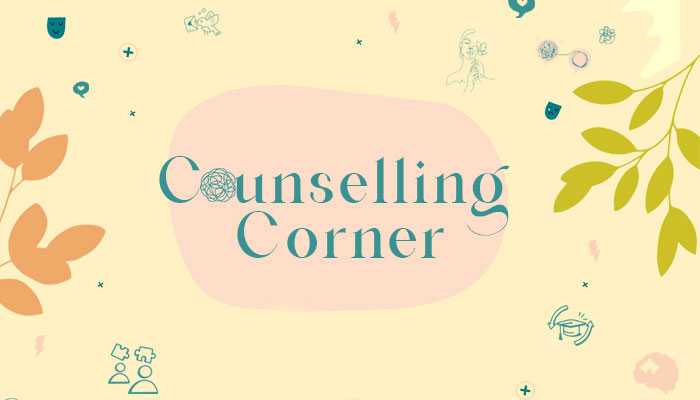
“I don’t have any trauma… which is why I don’t understand what the problem is”
Dear Haya,
Hope you’re doing well. I don’t exactly know what my problem is but I’ll try explaining it. My friends and family for the longest period have told me that I am “emotionally unavailable”, “heartless”, and “emotionless”. If you would ask my friends (friends of more than 15 years) to describe me the first words they would use will probably be mysterious, or generally a very laidback, chill person.
I am in a relationship right now and my partner has told me multiple times that my facial expressions make me look like I’m constantly tired, bored and indifferent, which I feel is not true but he’s not the only one who’s told me this.
Now, what I do know about myself is that I am not good at expressing or showing emotions, it takes me a very long time to understand what I feel, I don’t like the idea of being dependent on anyone, it scares me, getting into new relationships also scares me, I can’t accept new relationships. I am also very moody, I am not too fond of people touching me or coming too close.
I don’t have any trauma nor have I seen any broken marriages, I come from a loving family, which is why I don’t understand what the problem is.
Can you please guide me on how I can get better at expressing and understanding my emotions, I think my confidence level is also tied to this, once I get my emotions sorted, it will help me be more open and more confident.

Dear reader,
I hear you are struggling with your emotions. Navigating the complexities of emotions and relationships can be challenging and I see you are looking to create a space where you can establish emotional intimacy with yourself and others. It seems like a fear of intimacy is a significant aspect of your current experiences. Let’s explore this further.
Firstly, consider the term “emotional unavailability” and how it resonates with you. Reflect on the feedback from friends describing you as such — do their words align with your perception of yourself? It’s apparent that expressing your emotions is a struggle, and there might be an element of avoidance in your responses. This avoidance could be a defence mechanism, a way of protecting yourself from potentially overwhelming emotions.
I’m curious about your reluctance to express yourself and the association you draw between emotional expression and dependency. What is the belief system under this connection? What makes you feel expressing yourself equates you to being dependent on someone? What would it be like for you to start creating emotional space within? What is that you are struggling to face within that you are avoiding? What does showing emotions bring up for you? What is the belief behind dependency? What makes you feel being emotionally connected equates to dependency? You can’t accept new relationships, or you don’t want to? When people come too close, what comes up for you? What do you believe would happen if you were emotionally connected to others?
Exploring these thoughts and questions might uncover deep-seated fears or anxieties. Furthermore, understanding your feelings towards new relationships and the discomfort that arises when people get too close can provide valuable insights.
Avoidance, as seen in your tendency to take a long time to understand your emotions, typically stems from a fear of confronting challenging feelings. It is a fear-based response, from what you’d be forced to feel if you looked within.
Relationships are often a mirror to us. They bring out parts in us that we may be suppressing. They show us where our work lies. Your self-perception, where you believe you struggle to express emotions, take time to understand your feelings, fear dependence, and resist new relationships or physical closeness, hints at limiting beliefs that you might hold about yourself.
Difficulty in accepting new relationships may be a protective mechanism to maintain emotional distance, protecting yourself from potential emotional pain. This resistance could also be linked to a fear of loss, rejection, abandonment, or the challenges associated with forming deep emotional connections. It’s crucial to acknowledge these fears and reservations.
Exploring these aspects in therapy involves a journey into your past experiences, family dynamics and significant relationships. This process aims to identify the underlying beliefs and experiences that contribute to your current patterns. I sense that you try to intellectualise emotions. Emotions, by their nature, need to be felt and experienced.
Fear of dependency may be rooted in a desire for independence and self-reliance, possibly stemming from past experiences or personal beliefs. It could be helpful to explore factors that may have contributed to the development of that fear. Similarly, the apprehension towards new relationships may signify a disconnection with the self and a fear of the unknown. Past experiences, even if they are not traumatic, could be shaping your perception of relationships.
If you’re aspiring to create a life with emotional freedom, initiating the process of connecting with yourself and engaging in inner work is critical for you. it would be helpful to work with a therapist where therapeutic interventions may include various approaches to challenge and reframe unhelpful beliefs.
Doing experiential exercises within a safe therapeutic space will aid you in the practice of vulnerability and emotional expression. Building a trusting therapeutic relationship is foundational, which will serve as a model for other healthy emotional connections and provide a supportive environment for exploring and transforming these patterns.
Remember, this journey of self-discovery and growth is a gradual process, and each step forward, no matter how small, is a significant achievement.
And a personal note from a therapist — the inner journey is the most liberating and freeing journey you will ever go on. Good luck!

Haya Malik is a psychotherapist, Neuro-Linguistic Programming (NLP) practitioner, corporate well-being strategist and trainer with expertise in creating organisational cultures focused on well-being and raising awareness around mental health.
Send her your questions to [email protected]
Note: The advice and opinions above are those of the author and specific to the query. We strongly recommend our readers to consult relevant experts or professionals for personalised advice and solutions. The author and Geo.tv do not assume any responsibility for the consequences of actions taken based on the information provided herein. All published pieces are subject to editing to enhance grammar and clarity.

